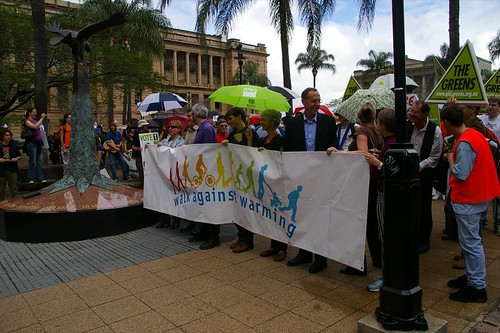October 15, 2007
From TheAge (Aust)
Howard still refuses to sign the Kyoto protocol citing that we'd be at an unfair disadvantage as China and other developing nations aren't included as part of it.
That is true but short-sighted and an excuse for inaction. Specifically:
- Kyoto Protocol is the legal basis for any international co-operation on climate change
- Developed countries should face their historical responsibility and their high per-capita emissions
- Australia has an 8% INCREASE over 1990 levels included in the Kyoto protocol. It is shameful we haven't even been able to stick to this
- These Developing countries were almost nothing (no disrepect!) back in 1996 when the Kyoto Protocol was drawn up. What was the argument back then?
- China and India have backed Kyoto and they are already meeting targets anyway!
- Bush didn't sign Kyoto and thus a real reason for Howard not to
- Howard is a luddite and lives in the past when polluting industries and coal in particular were king. The future is about efficiency and lean processes (minimal waste).
Prime Minister John Howard has dashed any hopes that he might end the government's Kyoto Protocol boycott, insisting he won't sacrifice economic growth to cut greenhouse gas emissions.
Mr Howard's first election campaign appearance on internet video site YouTube suggested the coalition would not be veering far from its existing climate change policy.
"The government will very shortly announce detailed plans on many issues including a climate change policy that balances our obligation to reduce greenhouse gas emissions with the need to keep our economy growing," he said.
The prime minister later reiterated his opposition to the Kyoto Protocol on economic grounds, but not necessarily its post-2012 successor.
"The reason I won't ratify the Kyoto treaty is: the existing Kyoto treaty doesn't cover countries like China, and we could be at a competitive disadvantage," he told Southern Cross Broadcasting.
"We'd be interested in ratifying a new international agreement that includes all of the major emitters because that would not put us at a competitive disadvantage."
Mr Howard's comment came after federal Environment Minister Malcolm Turnbull last week moved closer to accepting the Kyoto position by saying the government might sign an amended version for post-2012.
The independent Climate Institute argues that the necessary greenhouse gas cuts and a switch to clean energy can be made while sustaining economic growth.
"Government and independent groups such as ABARE and CSIRO show that strong economic growth is set to continue even if we substantially reduce emissions," chief executive John Connor said.
Federal Labor Leader Kevin Rudd says that ratifying the greenhouse blueprint would give Australia a greater say in climate change talks and help persuade China to commit on emissions cuts.
Mr Rudd said while the Kyoto treaty expires within five years, endorsing it would give the government a greater role in international climate change policy, starting at a Bali conference in December.
"If you haven't ratified Kyoto, you don't get to vote, that's the problem," he told Southern Cross.
"I want to be an international voice for Australia which is carving out the future arrangements."
Mr Rudd said China's argument for not accepting greenhouse targets had been because developed nations like Australia and the United States had refused to do so.
"Unless we in this country fix the China emissions problem with an international set of rules which bind both economies as well, then frankly our future is deeply compromised."
The Australian Greens have urged more federal investment in public transport as a way of tackling climate change.
Senator Kerry Nettle called on the commonwealth to ensure the states had the funding they needed to improve transport systems.
An environmental network gave both of the major parties low marks for their climate change policies, but put Labor ahead of the government.
Using nine criteria, The Big Switch gave the coalition a grade of 0.8 out of five and Labor 1.8.
National coordinator Tricia Phelan said Labor fell down by supporting the continued use of coal, while the coalition's response so far is "completely inadequate".
Read the article.





No comments:
Post a Comment